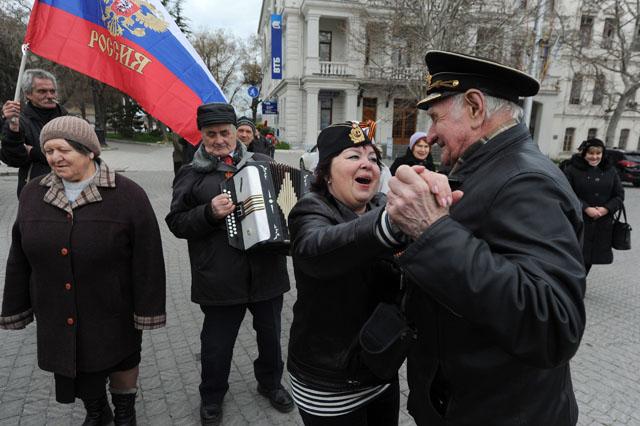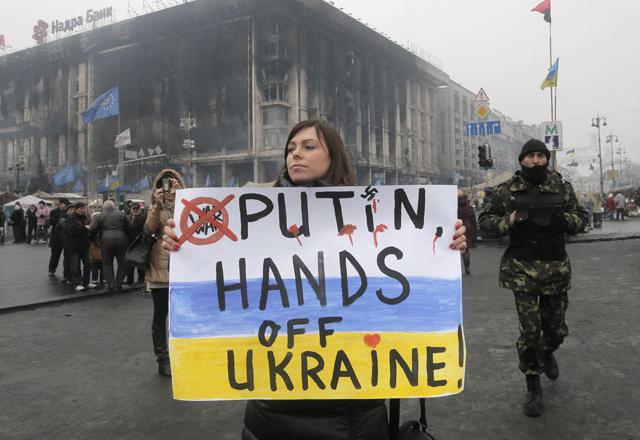You are here
US, EU to work together on tougher Russia sanctions
By Reuters - Mar 26,2014 - Last updated at Mar 26,2014

BRUSSELS/MOSCOW — The United States and the European Union agreed on Wednesday to work together to prepare possible tougher economic sanctions in response to Russia’s behaviour in Ukraine, including on the energy sector, and to make Europe less dependent on Russian gas.
US President Barack Obama said after a summit with top EU officials that Russian President Vladimir Putin had miscalculated if he thought he could divide the West or count on its indifference over his annexation of Crimea.
Leaders of the Group of Seven major industrial powers decided this week to hold off on sanctions targeting Moscow’s economy unless Putin took further action to destabilise Ukraine or other former Soviet republics.
“If Russia continues on its current course, however, the isolation will deepen, sanctions will increase and there will be more consequences for the Russian economy,” Obama told a joint news conference with European Council President Herman Van Rompuy and European Commission President Jose Manuel Barroso.
He also said NATO should step up its presence in new east European member states bordering on Russia and Ukraine to provide reassurance that the alliance’s mutual defence guarantee would protect them.
Russian forces in Crimea captured the last Ukrainian navy ship after firing warning shots and stun grenades, completing Moscow’s grip on military installations in the Black Sea peninsula. Kiev has ordered its forces to withdraw.
Western concern has focused on Russian troops massed on Ukraine’s eastern border amid Kremlin allegations of attacks on Russian speakers in that industrial region of the country.
But Polish Prime Minister Donald Tusk said on Wednesday it seemed likely that the firm Western response so far would stop Russia undertaking what he called “other acts of aggression and interference on the territory of Ukraine”.
The new Ukrainian authorities announced a radical 50 per cent increase in the price of domestic gas from May 1, meeting an unpopular condition for International Monetary Fund aid which Russian-backed President Viktor Yanukovych had refused before he was ousted last month.
Kiev is seeking $15-20 billion in IMF assistance to help stabilise its shattered economy. Russia has said it will increase the price it charges Ukraine for gas from April.
Develop your own
In response to EU pleas to expand US gas exports to Europe to reduce reliance on Russian supplies, Obama said a new transatlantic trade deal under negotiation would make it easier to licence such sales.
However, he said Europe should also look to develop its own energy resources — a veiled reference to environmental resistance to shale gas extraction and nuclear power — and not just count on America.
Russia provides around one third of the EU’s oil and gas and some 40 per cent of the gas is exported through Ukraine.
“You cannot just rely on other people’s energy, even if it has some costs, some downside,” the EU ambassador to Washington quoted Obama as telling his EU hosts over a working lunch.
The World Bank warned that the economic impact of annexing Crimea from Ukraine could drive Russia into a sharp recession this year even if the West stops short of trade sanctions.
A World Bank report on the Russian economy, compiled before the most recent evidence of the scale of capital flight, made clear Moscow was already set to pay a significant price in lost growth due to the most serious East-West confrontation since the end of the Cold War.
Gross domestic product could contract by as much as 1.8 per cent in 2014 if the crisis persists, it said. That high-risk forecast assumes that the international community would still refrain from trade sanctions.
“An intensification of political tension could lead to heightened uncertainties around economic sanctions and would further depress confidence and investment activities,” the World Bank said.
“We assume that political risks will be prominent in the short-term.”
Under a low-risk scenario, assuming only a short-lived impact from the crisis, GDP could grow by 1.1 per cent, just half the bank’s 2.2 per cent growth forecast published in December.
Russian stocks rebound
Russia is refusing to recognise the Kiev government chosen by parliament after the overthrow of Yanukovich on February 22 following months of street protests against his refusal to sign a pact on closer ties with the EU.
So far, the United States and the EU have imposed personal sanctions against Russian and Crimean officials involved in the seizure of the peninsula and Washington has slapped visa bans and asset freezes on senior business figures close to Putin.
Neutral Switzerland, one of the world’s major offshore banking centres, said it would take steps to ensure it was not used to circumvent those sanctions.
Russian markets and the rouble have been shaken, resulting in massive capital outflows, now estimated by the economy ministry at up to $70 billion in the first quarter alone compared with $63 billion in the whole of last year.
However, Russian stocks clawed back more ground on Wednesday and the rouble strengthened as a relief rally continued due to signs of an easing of tensions over Crimea. Russian assets have rallied as investors calculate that the annexation will not trigger more serious Western sanctions.
The Ukraine crisis has largely pushed aside strains in the US-EU relationship over last year’s disclosures of large-scale spying by Washington on European allies, which only drew a brief mention at the summit.
British Prime Minister David Cameron has led the charge for the adoption of technologies such as shale gas fracking in response to the Ukraine crisis.
“Some countries are almost 100 per cent reliant on Russian gas, so I think it is something of a wake-up call,” Cameron said on Tuesday.
He pointed to reserves of shale gas in southeastern Europe, Poland and England that could be extracted by the process of pumping liquids at high pressure into underground rock formations known as fracking, widespread in the United States.
Environmentalists say fracking is a threat to the water table and can cause earthquakes and landslides. Countries such as France and Bulgaria have banned it and others such as Britain and Poland have faced anti-fracking protests.
Related Articles
Crimea’s declaration of independence Monday from Ukraine triggered the toughest Western sanctions against Russia since the Cold War — with Washington and the European Union retaliating with asset freezes and travel bans and US President Barack Obama vowing to “increase the cost” if the Kremlin does not back down.
Pro-Moscow protesters in eastern Ukraine seized arms in one city and declared a separatist republic in another, in moves Kiev described on Monday as part of a Russian-orchestrated plan to justify an invasion to dismember the country.
President Barack Obama declared on Thursday that a referendum in 10 days on the future of a Ukraine’s Crimea peninsula would violate international law. The United States also moved to impose visa restrictions and financial sanctions on Russians and Ukrainians for the moves Moscow already has made into Crimea.


















